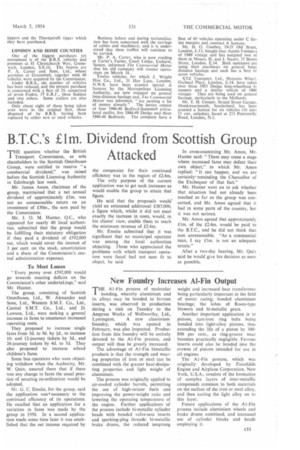B.T.C.'s Lim. Dividend from Scottish Group Attacked
Page 49

If you've noticed an error in this article please click here to report it so we can fix it.
THE question whether the British Transport Commission, as sole shareholders in the Scottish Omnibuses Group, were entitled to receive "a comtnercial dividend," was raised before the Scottish Licensing Authority in Edinburgh last week.
Mr. James Amos, chairman of the group, maintained that a net annual dividend of approximately £1m. was not an unreasonablereturn on an investment of £30m., the sum paid by the Commission.
Mr. J. O. M. Hunter, Q.C., who appeared for nearly 40 local authorities, submitted that the group would be fulfilling their statutory obligation if they paid a dividend of £592,000 net. which would cover the interest of 3 per cent, on the stock, amortization and a share of the Commission's central administration expenses.
To Meet Losses
"Every penny over £592,000 would go towards meeting deficits on the Commission's other undertakings," said Mr. Hunter.
The group, consisting of Scottish Omnibuses, Ltd., W. Alexander and Sons, Ltd., Western S.M.T. Co., Ltd., Central S.M.T. Co., Ltd., and D. Lawson, Ltd., were seeking a general increase in fares to counteract increased operating costs.
They proposed to increase single fares from 3d. to 9d. by Id., to increase 10and 12-journey tickets by 3d., and 24-journey tickets by 4d. to 5d. They also proposed to increase school children's fares.
Some bus operators who were objecting withdrew when the Authority, Mr. W. Quin, assured them that if there was any change in fares the usual practice of securing co-ordination would be adopted.
Mr. G. C. Emslie, for the group, said the application was•necessary to the continued efficiency of its operations. He recalled that an application for a variation in fares was made by the group in 1950. In a second application made some time later it was established that the net income required by the companies for their continued efficiency was in the region of £2.4m.
The only purpose of the current application was to get such increases as would enable the group to attain that figure.
He said that the proposals would' yield an estimated additional £385,000, a figure which, whilst it did not meet exactly the increase in costs, would, in his clients' view, enable them to reach the minimum revenue of £2.4m.
Mr. Emslie submitted that it was significant that no municipal operator was among the local authorities objecting. Those who appreciated the problems with which transport operators were faced had not seen fit to object, he said. In cross-examining Mr. Amos, Mr. Hunter said: "There may come a stage where increased fares may defeat their own object," to which Mr. Amos replied: " It can happen, and we are certainly. reminding the Chancellor of the Exchequer of that fact."
Mr. Hunter went on to ask whether that situation had not already been reached so far as the group was concerned, and Mr. Amos agreed that it had in some parts of the country, but it was not serious.
Mr. Amos agreed that approximately Elm, of the £2.4m. would be paid to the B.T.C., and he did not think that sum unreasonable. "As a commercial man, I say £1m. is not an adequate return."
After a two-day hearing, Mr. Quin said he would give his decision as soon as possible.




































































































